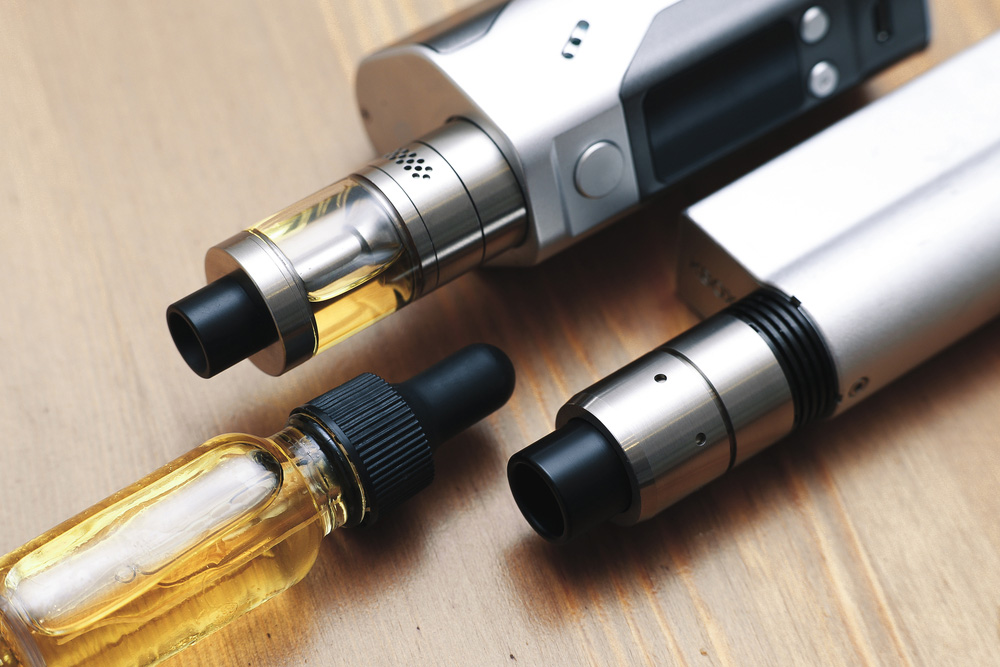
Even if you don’t vape yourself, the chances are pretty good you’ve seen someone puffing away on what looks like a pen. You probably even noticed there wasn’t much of a smell as they exhaled billows of something resembling smoke. This is because it’s not smoke, it’s actually water vapor. The act of smoking electronic cigarettes or personal vaporizers is known as vaping. While those in the vaping industry tout their products as a safer, smoke-free alternative to tobacco cigarettes (and they can be), vaping isn’t without its risks. However, as an Abbotsford and Surrey orthodontist, Dr. Sharma isn’t here to go over all of the potentially negative health effects of vaping. Instead, we’re focusing on the oral health concerns related to the trend. If you have questions about vaping and teeth, Aura Orthodontics is here to shed some light on the subject.
What is Vaping?
As we said, vaping is the act of smoking e-cigs or “vape pens.” The most common form of personal vaporizers are rechargeable devices that hold flavored liquid, often called e-liquid or vape juice. The juice usually, but not always, contains nicotine. The heating element in the device vaporizes the liquid and transforms it into an aerosol that’s inhaled. Vaping really took off in popularity as a way for cigarette smokers to wean themselves off of tobacco and ultimately quit smoking or to decrease the harmful effects of smoking by getting nicotine in a safer form. However, eventually, even some non-smokers started vaping, most likely because the e-liquid comes in thousands of flavors with and without nicotine, ranging from bubblegum to deep fried apple.
Are E-Cigarettes Bad for Your Teeth?
While the debate over the health consequences of vaping has been raging on for years, the U.K. Centre for Tobacco and Alcohol Studies found that e-cigarettes are approximately 95% safer than smoked tobacco since they don’t contain certain chemicals like carbon monoxide and tar, both of which are severely damaging to smokers’ health. Health Canada has had e-cigarette regulations in the works but acknowledges the benefits for harm reduction and is aiming many of the rules at protecting children and teens. The FDA also recently took the harm reduction route by staving off further regulation of the vaping industry in the United States and instead is focusing on trying to prevent tobacco-related deaths. With that said, notice vaping is thought to be 95% safer than smoking and not 100% safer. Obviously, abstaining altogether would be your best bet.
Though the lesser of the two evils, the e-liquid in vape pens comes in so many flavors from so many manufacturers that there aren’t set standards for the ratio of ingredients and the ratio is what determines how many chemical byproducts occur when the liquid is vaporized. Most brands contain propylene glycol, glycerin, nicotine, and flavoring, which are generally considered safe. However, when heated, carbonyls could possibly be produced. This group of compounds includes formaldehyde and acrolein, which aren’t good for your health. While nearly a thousand times more carbonyls and other carcinogens are produced by tobacco cigarettes, toxins have been found in e-cigarettes, meaning there are risks.
Thinking About Improving Your Smile? Contact Us!
At this point, it’s well known that smoking or chewing tobacco can cause oral cancer, gum disease, and tooth loss, not to mention unsightly staining but what about vaping? Well, a lot of experts are mainly concerned with ruling out damage to the cardiovascular and respiratory systems from e-cig use so there hasn’t been a ton of research concerning how it relates to dental health. The good news is, no correlation has been found between vaping and teeth stains. However, the rest of the dental issues still require further study. As for oral cancer and vaping, there have been extremely conflicting findings. But, keep in mind, whenever toxins, vaporized or not, are coming into contact with your mouth, you do have to consider the possibility and use caution.
In questionnaires, commonly reported side effects of e-cigs were mouth and throat dryness and irritation. Dry mouth can lead to tooth decay and bad breath so it’s important to sip water frequently and keep your saliva flowing if you are vaping. Additionally, some people complain of vaping causing mouth sores or say vaping makes gum bleed. The hot aerosol vapor is drawn directly into your mouth, which could be one reason why irritation and things like sores would develop.
Nicotine and Teeth and Gum Health
Even though there may not be enough research to say conclusively if vaping itself is terrible for your oral health or not, we do know that nicotine use has consequences for your teeth and gums. For those whose vape juice is laced with nicotine, take heed.
- Studies have found that nicotine can be a major contributing factor in the development and progression of periodontal diseases (i.e., gingivitis and periodontitis). Nicotine reduces blood flow because it’s what’s known as a vasoconstrictor. This deprives the gums of oxygen and nutrients, which in turn, causes gums to recede and may eventually result in gum disease. While tobacco compounds the issue, regardless of the delivery, nicotine is not a friend to your gum tissue.
- Nicotine may also lead to dry mouth since it reduces the flow of saliva. As previously noted, dry mouth is a common complaint among those who vape whether or not their vape juice contains nicotine. One can only guess that the addition of nicotine could make it even worse. Drinking enough water throughout the day, chewing sugar-free gum or sucking on sugar-free hard candies are good ways to ensure you’re producing saliva. Saliva is essential for washing away cavity-causing bacteria. Chronic dry mouth is a recipe for tooth decay.
- Nicotine is stimulating and similar to all stimulants, it exacerbates bruxism (teeth grinding). The nicotine content in e-cigarettes is relatively low in comparison to tobacco cigarettes, however, if you do clench and grind your teeth normally, keep an eye on the problem to make sure it’s not getting worse. Teeth grinding can cause premature wear of your enamel, cracked or chipped teeth, jaw pain and headaches.
The Bottom Line
Sure, vaping is preferable to smoking tobacco cigarettes but it’s by no means a healthy activity so, of course, as a doctor, it’s not something Dr. Sharma would recommend. Plus, as researchers direct more of their attention to studying e-cigarettes, the current thoughts and views could change. If you’re able to quit e-cigs without going back to using tobacco products, it’s in your best interest. For those who want to continue vaping, don’t hide it from your dentist or orthodontist. Keep up with your oral hygiene routine and regular dental exams to maintain the health of your smile.





